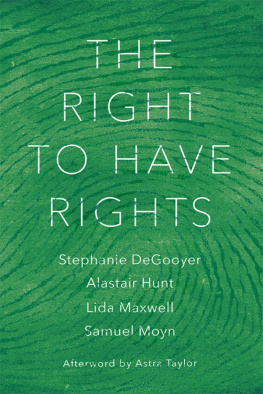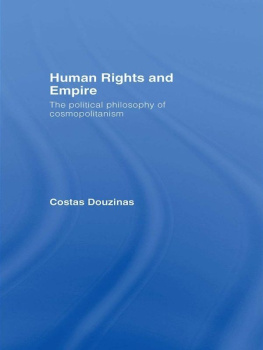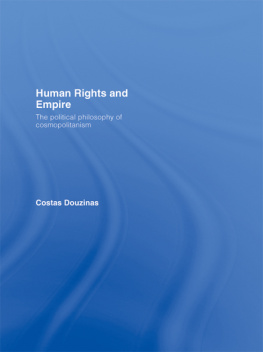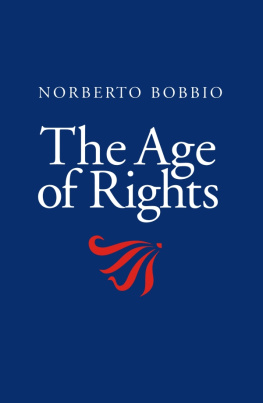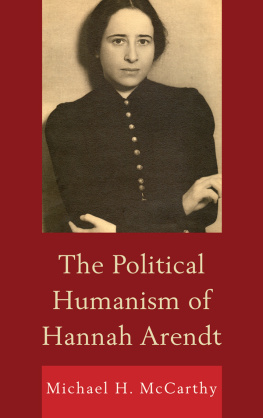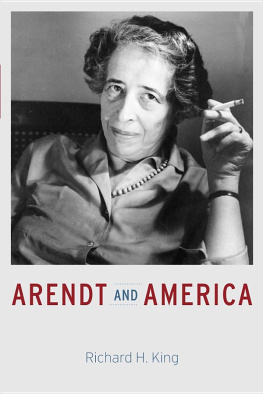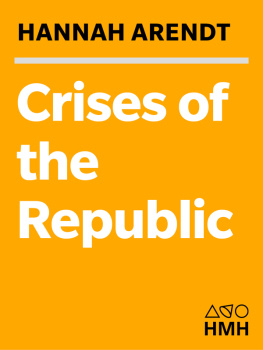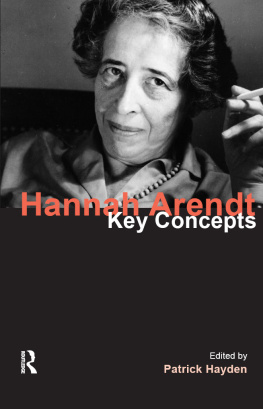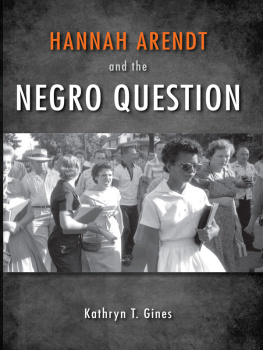Once they had left their homeland they remained homeless, once they had left their state they became stateless; once they had been deprived of their human rights they were rightless, the scum of the earth.
I
Between the ages of 27 and 45, Hannah Arendt was a stateless refugee. In 1933, fearing for her life in Hitlers Germany, she sought safety in Paris. Two years later the Nuremberg Laws formally confirmed what she had already intuited from her experience: she and all other German Jews were no longer citizens of the Reich. Effectively, she was homeless. After the outbreak of the war in 1939, the French government interned her and other enemy nationals at a camp at Gurs in southern France. Amid the chaos caused by the German occupation of France in 1940, Arendt escaped and made her way deeper into the unoccupied part of the country. Seeking a way out of Europe, she appealed to US diplomats. However, the State Department discouraged the issuance of visas to any of the thousands of refugees fleeing the Nazis. Through a combination of sheer luck, quick thinking, and assistance from several individuals, including an American diplomat prepared to defy his governments directives, Arendt was able to secure a Nansen passport, a French exit visa, Spanish and Portuguese transit visas, and a US emergency visa. These documents allowed her to travel, in 1941, to the United States, where she was granted asylum as a refugee. In 1951, she was naturalized as a US citizen.
That same year, Arendt published her first English-language book, The Origins of Totalitarianism. In one of the books central chapters, she reflected on what her experience as a stateless refugee had taught her about the ways in which individuals come to lose and gain rights. That Arendt was able to leave war-entrenched Europe, for example, had nothing to do with her humanity or the intercession of any concerned government: it was circumstance and accident. Whereas the Universal Declaration of Human Rights, which appeared in 1948 in response to these events, proclaimed that human beings have rights simply by virtue of being human, Arendt knew firsthand that in order to have rights, individuals must be more than mere human beings. They must be members of a political community. Only as a citizen of a nation-state can a person enjoy legally protected rights to education, to work, to vote, to healthcare, to culture, and so on. Hence, Arendt declared that before there can be any specific civil, political, or social rights, there must be such a thing as a right to have rights.
Arendt was writing about her own time and experience. The argument of the present book, however, is that her phrasethe right to have rightsoffers a key resource for thinking and acting politically in our own moment, especially in an age where an ever-increasing number of people across the globe are unable to secure meaningful membership in any political community. The most conspicuous group in this predicament are, of course, the migrants and refugees who have been forced by violent conflict or climate change to flee their homelands and seek asylum in other countries. The United Nations High Commissioner for Refugees reports that, as of 2015, there are 65.3 million forcibly displaced people worldwide, 21.3 million of them refugees. Those without functioning citizenship, however, also include the millions of undocumented immigrants, or sans papiers, who reside in countries without holding the legal permission to do so. A smaller but no less significant group includes those currently held in indefinite detention without trial by supposedly civilized governments. Yet another group comprises ordinary workers of many western nations who, although legally citizens of the country in which they live, find their ability to access the full range of citizens rights threatened by the assault of neoliberal market fundamentalism on public institutions. Compounding the problems faced by all of these groups is the rise of neoliberal populist movements worldwide, which have made a trade out of xenophobic and nativist rhetoric and used this rhetoric, successfully, to gain political powerwith, ironically, support from the disenfranchised citizens whose precarious predicament they have created.
A number of activists and scholars have already called upon Arendts right to have rights to make sense of and intervene into our current struggles in democratic politics. Most of them, however, tend to treat the phrase as merely another, more poetic name for human rights. This is perhaps understandable among activists who are eager to find assistance for their causes. However, even scholars who give Arendts phrase, and the argument that threw it up, more thorough consideration tend to reduce the right to have rights to a new-and-improved version of human rights. Arendt would have been critical of such a move. In her work, the phrase is born out of a critique of human rights. This critique is not only directed at the inadequacy of the institutional mechanisms meant to ensure the practical implementation of these rights, but also at the insufficiency of human rights as a theoretical concept coherent enough to become the basis of democratic politics.
This book aims to develop resources for democratic struggle by offering critical readings of the right to have rights that are attentive to subtleties, complexities, ambiguities, and potentialities too quickly glossed over in existing interpretations of the phrase. Without dismissing the importance of campaigns for human rights, the contributors to this volume aim to challenge the reflexive assimilation of Arendts phrase into the paradigm of human rights. We do so by turning to the texts in which Arendt first developed the phrase and to those places in her larger body of work where we hear the phrase resonating. In all cases, we try to understand, as precisely as we can, the argument she makes and the rhetorical features of her texts, even when they might seem marginal or minor, as symptoms of her own intellectual struggle.
Moreover, unlike much of the scholarship that does exist on the right to have rights, we find it important to look beyond the first right in the phrase. Taken together the four chapters give equal consideration to all of the constructions parts: its two nouns (right and rights), its infinitive verb (to have), and even its hidden subject. Thus, in the first chapter, Stephanie DeGooyer thinks critically about whether this single right to have rights really is any kind of foundation at all; in , Alastair Hunt asks after the implied, but unnamed, bearers of the right to have rights. The afterword by Astra Taylor looks outside the phrase altogether, to its relevance to the conditions of what she calls transnational oligarchy, or the deterritorialized flows of capital that threaten to make all people, even citizens, dispossessed and rightless.

